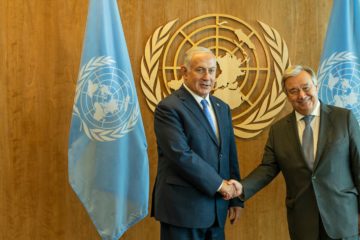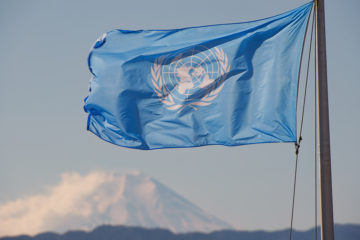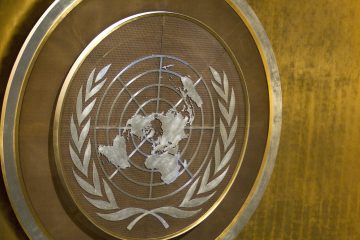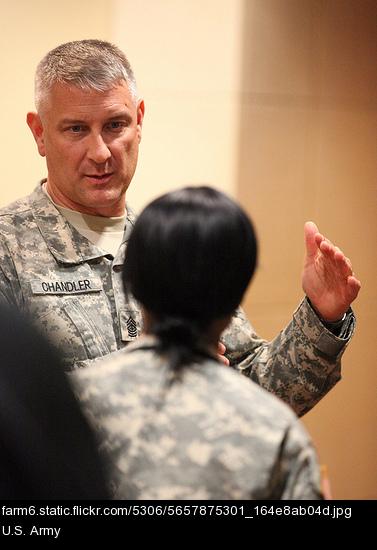
‘Uniting for Peace’ Against Israel’s Annexation Plan
With the diversion of Israel’s military resources towards West Bank, Israeli annexation of occupied Palestinian territory appears imminent, pending approval from and coordination with the American administration. Struggling to rally right-wing voters amidst the fight for his political survival in the elections of April, September 2019 and March 2020, Prime Minister Benjamin Netanyahu had stated that he would “apply Israeli sovereignty” over the West Bank, if re-elected. Bolstered by the reversal of decades of American policy on the issue and the subsequent release of Trump’s much criticized, one-sided ‘Middle East Peace Plan’ in January 2020, Netanyahu has aggressively pursued the annexation agenda with the emergency government formed with Benny Gantz in March 2020. Considering the expected blockage of the Security …

Book Review: Richard Caplan’s “Measuring Peace: Principles, Practices and Politics”
In Measuring Peace, Professor Richard Caplan of the University of Oxford has written an insightful guide for students and practitioners of peace. The book will help those who want to understand the fundamental principles and existing practices of how to assess peace while at the same time outlining some critical political constraints. Caplan provides a succinct and clear analysis of key approaches to peace measurements, their weaknesses and ways to move forward. Due to its accessibility and policy relevance, the book also stands out among other publications that have sought to evaluate and grapple with the question of how to judge the quality of existing peace. The key aim of the book is to give peacebuilders a ‘compass’ to navigate the post-war peace …

How effective is UN peacekeeping?
Peacekeeping is at the centre of the UN’s efforts to maintain international peace and security. Today, more than 100,000 soldiers and police from 125 countries are serving as blue-helmeted UN peacekeepers around the world. These soldiers and police are endeavouring to keep the peace within, or between, more than 20 conflict-affected states and territories. How effective are UN peacekeeping efforts? There have been spectacular failures (Rwanda) and notable successes (El Salvador) but how great is the contribution of UN peacekeeping overall? Scholars are divided on this question. Virginia Page Fortna’s seminal work on the impact of UN peacekeeping operations (UNPKOs) suggests that the presence of UNPKOs significantly improves the chances of peace surviving following the cessation of hostilities. In the …

Nuclear weapons and the dialectic of universalism: the UN convenes to ban the bomb
In late March of this year, a majority of the world’s states will meet at the United Nations headquarters in New York City to start negotiations on a nuclear weapons prohibition treaty. It will be a landmark event in international history. Not only have such negotiations never been held before—nuclear weapons remain the only class of weapons of mass destruction (WMD) not explicitly prohibited by international law—the process itself also marks a turning point in multilateral diplomacy. Emerging as an element of the European “standard of civilization” in the 19th century, the laws of war were meant, in part, to distinguish “civilised” Europe from the “uncivilised” rest of the world. As the good news and its missionaries spread to ever …

Background Check on the UN
What is the United Nations? What does it do and how does it do what it does? Together with Sam Daws, Natalie Samarasinghe has recently co-edited a leading eight-volume reference text on the United Nations – The SAGE Major Work on the United Nations. It is dedicated to the structures and the role of the UN over the course of its history and at the present juncture. In this Q&A, Natalie Samarasinghe, Executive Director of the United Nations Association (UNA-UK), responds to the questions of Oxford graduate Genevieve Woods.

International organisations on the loose? Sovereignty and international military operations
Dr Hylke Dijkstra has recently published a new book entitled International Organizations and Military Affairs (Routledge, 2016). This book represents the first comparative study of the politics behind the scenes at the United Nations, NATO and the European Union concerning the use of military force. It is also the result of a research project carried out at the DPIR in Oxford. DPhil candidate Dana Landau interviews him on the most pertinent questions that arise from his work.

The Responsibility to Protect: the Imperative and the Challenge
The Responsibility to Protect: the Imperative and the Challenge
Play Episode
Pause Episode
Mute/Unmute Episode
Rewind 10 Seconds
1x
Fast Forward 30 seconds
00:00
/
Subscribe
Share
RSS Feed
Share
Link
Embed
Download file | Play in new windowAt the University of Oxford Alumni Weekend, 17 September 2011, Dr Hugo Slim and Professor Jennifer Welsh, from the Oxford Institute for Ethics, Law and Armed Conflict (ELAC), discussed the concept of the ‘Responsibility to Protect’ or R2P in contemporary international relations, and its role in key cases such as Libya and post-election violence in Kenya. Dr Slim discussed the rise of the idea that certain people should be protected in times of war, suggesting that the word ‘civilian’ became a centrepiece of policy during the Bosnian War of the 1990s. He went on to talk about the role and types of ideology that encourage violence against civilians during conflict. Anti-civilian ideology, or the idea that a whole group of …
The elephant in the tent: social and political justice, Tel Aviv, August 2011: a response to Or Rosenboim
Tel Aviv has known many hot summers in its history. But 2011 will probably be remembered as an exceptionally burning summer, one in which the city was flooded by tents occupied by young middle class residents, protesting against the rise in the cost of living. As Or Rosenboim argues, these protests were characterised by the claim to “go beyond the political”, to ask for social justice, referring to the colloquial distinction between issues relating to security and defence, and particularly, the Israeli-Palestinian conflict, regarded as “the political”, and “the social”. I wish to argue that these protests are closely interlinked to questions of foreign policy even though they put in much time and effort to avoid them. In a video …









